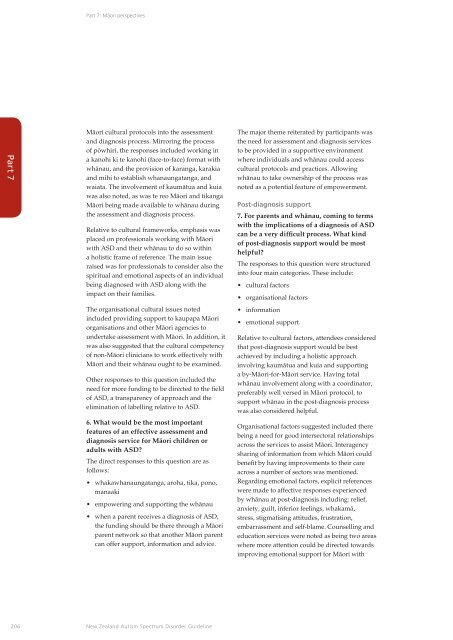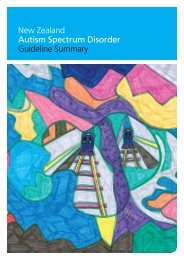New Zealand Autism Spectrum Disorder Guideline - Ministry of Health
New Zealand Autism Spectrum Disorder Guideline - Ministry of Health
New Zealand Autism Spectrum Disorder Guideline - Ministry of Health
You also want an ePaper? Increase the reach of your titles
YUMPU automatically turns print PDFs into web optimized ePapers that Google loves.
Part 7: Mäori perspectives<br />
Part 7<br />
Mäori cultural protocols into the assessment<br />
and diagnosis process. Mirroring the process<br />
<strong>of</strong> pöwhiri, the responses included working in<br />
a kanohi ki te kanohi (face-to-face) format with<br />
whänau, and the provision <strong>of</strong> karanga, karakia<br />
and mihi to establish whanaungatanga, and<br />
waiata. The involvement <strong>of</strong> kaumätua and kuia<br />
was also noted, as was te reo Mäori and tikanga<br />
Mäori being made available to whänau during<br />
the assessment and diagnosis process.<br />
Relative to cultural frameworks, emphasis was<br />
placed on pr<strong>of</strong>essionals working with Mäori<br />
with ASD and their whänau to do so within<br />
a holistic frame <strong>of</strong> reference. The main issue<br />
raised was for pr<strong>of</strong>essionals to consider also the<br />
spiritual and emotional aspects <strong>of</strong> an individual<br />
being diagnosed with ASD along with the<br />
impact on their families.<br />
The organisational cultural issues noted<br />
included providing support to kaupapa Mäori<br />
organisations and other Mäori agencies to<br />
undertake assessment with Mäori. In addition, it<br />
was also suggested that the cultural competency<br />
<strong>of</strong> non-Mäori clinicians to work effectively with<br />
Mäori and their whänau ought to be examined.<br />
Other responses to this question included the<br />
need for more funding to be directed to the field<br />
<strong>of</strong> ASD, a transparency <strong>of</strong> approach and the<br />
elimination <strong>of</strong> labelling relative to ASD.<br />
6. What would be the most important<br />
features <strong>of</strong> an effective assessment and<br />
diagnosis service for Mäori children or<br />
adults with ASD?<br />
The direct responses to this question are as<br />
follows:<br />
• whakawhanaungatanga, aroha, tika, pono,<br />
manaaki<br />
• empowering and supporting the whänau<br />
• when a parent receives a diagnosis <strong>of</strong> ASD,<br />
the funding should be there through a Mäori<br />
parent network so that another Mäori parent<br />
can <strong>of</strong>fer support, information and advice.<br />
The major theme reiterated by participants was<br />
the need for assessment and diagnosis services<br />
to be provided in a supportive environment<br />
where individuals and whänau could access<br />
cultural protocols and practices. Allowing<br />
whänau to take ownership <strong>of</strong> the process was<br />
noted as a potential feature <strong>of</strong> empowerment.<br />
Post-diagnosis support<br />
7. For parents and whänau, coming to terms<br />
with the implications <strong>of</strong> a diagnosis <strong>of</strong> ASD<br />
can be a very difficult process. What kind<br />
<strong>of</strong> post-diagnosis support would be most<br />
helpful?<br />
The responses to this question were structured<br />
into four main categories. These include:<br />
• cultural factors<br />
• organisational factors<br />
• information<br />
• emotional support.<br />
Relative to cultural factors, attendees considered<br />
that post-diagnosis support would be best<br />
achieved by including a holistic approach<br />
involving kaumätua and kuia and supporting<br />
a by-Mäori-for-Mäori service. Having total<br />
whänau involvement along with a coordinator,<br />
preferably well versed in Mäori protocol, to<br />
support whänau in the post-diagnosis process<br />
was also considered helpful.<br />
Organisational factors suggested included there<br />
being a need for good intersectoral relationships<br />
across the services to assist Mäori. Interagency<br />
sharing <strong>of</strong> information from which Mäori could<br />
benefit by having improvements to their care<br />
across a number <strong>of</strong> sectors was mentioned.<br />
Regarding emotional factors, explicit references<br />
were made to affective responses experienced<br />
by whänau at post-diagnosis including: relief,<br />
anxiety, guilt, inferior feelings, whakamä,<br />
stress, stigmatising attitudes, frustration,<br />
embarrassment and self-blame. Counselling and<br />
education services were noted as being two areas<br />
where more attention could be directed towards<br />
improving emotional support for Mäori with<br />
206<br />
<strong>New</strong> <strong>Zealand</strong> <strong>Autism</strong> <strong>Spectrum</strong> <strong>Disorder</strong> <strong>Guideline</strong>











